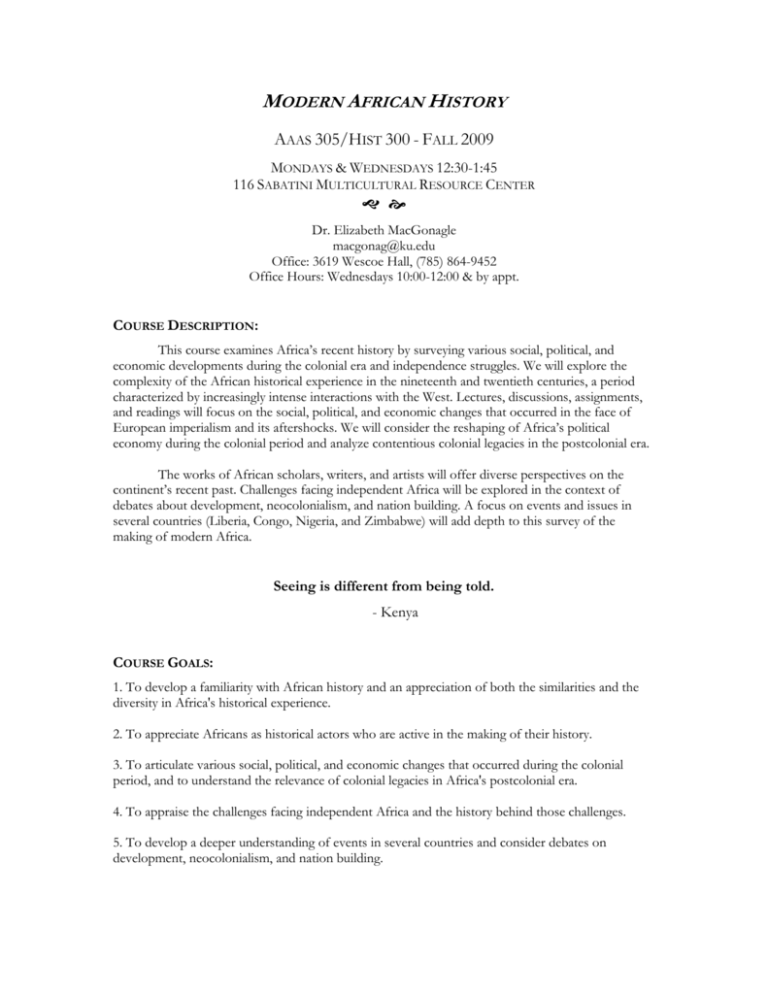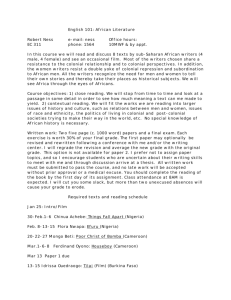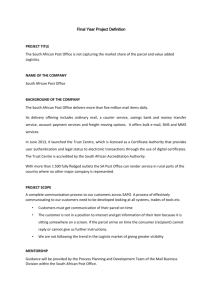modern african history
advertisement

MODERN AFRICAN HISTORY AAAS 305/HIST 300 - FALL 2009 MONDAYS & WEDNESDAYS 12:30-1:45 116 SABATINI MULTICULTURAL RESOURCE CENTER Dr. Elizabeth MacGonagle macgonag@ku.edu Office: 3619 Wescoe Hall, (785) 864-9452 Office Hours: Wednesdays 10:00-12:00 & by appt. COURSE DESCRIPTION: This course examines Africa’s recent history by surveying various social, political, and economic developments during the colonial era and independence struggles. We will explore the complexity of the African historical experience in the nineteenth and twentieth centuries, a period characterized by increasingly intense interactions with the West. Lectures, discussions, assignments, and readings will focus on the social, political, and economic changes that occurred in the face of European imperialism and its aftershocks. We will consider the reshaping of Africa’s political economy during the colonial period and analyze contentious colonial legacies in the postcolonial era. The works of African scholars, writers, and artists will offer diverse perspectives on the continent’s recent past. Challenges facing independent Africa will be explored in the context of debates about development, neocolonialism, and nation building. A focus on events and issues in several countries (Liberia, Congo, Nigeria, and Zimbabwe) will add depth to this survey of the making of modern Africa. Seeing is different from being told. - Kenya COURSE GOALS: 1. To develop a familiarity with African history and an appreciation of both the similarities and the diversity in Africa's historical experience. 2. To appreciate Africans as historical actors who are active in the making of their history. 3. To articulate various social, political, and economic changes that occurred during the colonial period, and to understand the relevance of colonial legacies in Africa's postcolonial era. 4. To appraise the challenges facing independent Africa and the history behind those challenges. 5. To develop a deeper understanding of events in several countries and consider debates on development, neocolonialism, and nation building. MODERN AFRICAN HISTORY, PAGE 2 6. To examine contemporary Western attitudes towards Africa and its history, including perceptions and misperceptions in the U.S. 7. To analyze change over time in the African setting, express an understanding of historical methods, and consider various perspectives of the continent's past. 8. To generate and express ideas about African history successfully through writing and other course activities such as assignments, research projects, and class discussions. BOOKS: REQUIRED: Curtis Keim, Mistaking Africa: Curiosities and Inventions of the American Mind (2nd ed.; Westview, 2008) A. Adu Boahen, African Perspectives on Colonialism (Johns Hopkins, 1989) Adam Hochschild, King Leopold’s Ghost (Mariner, 1999) Colin Legum, Africa since Independence (Indiana, 1999) CHOICE of either Tsitsi Dangarembga, Nervous Conditions (Seal, 2004) or Chris Abani, Graceland (Picador, 2005) Note that only limited copies of Graceland will be available at Oread Books. RECOMMENDED: John Parker and Richard Rathbone, African History: A Very Short Introduction (Oxford, 2007) SHORT READINGS AVAILABLE ONLINE: Primary Documents on Imperialism & Resistance (posted on Blackboard) Mats Utas, "Victimcy, Girlfriending, Soldiering: Tactic Agency in a Young Woman's Social Navigation of the Liberian War Zone," Anthropological Quarterly, 78, 2 (Spring 2005) pp. 403-30 James Traub, "The Celebrity Solution," New York Times Magazine (Money Issue - March 9, 2008) Wisdom does not come overnight. - Somalia REQUIREMENTS AND EVALUATION: 1) Regular attendance and thoughtful participation in class activities (including Blackboard). (10%) 2) Three papers on the assigned readings. (15% each) 3) Research project and paper. (25%) 4) Final exam on course themes. (20%) MODERN AFRICAN HISTORY, PAGE 3 DETAILS ABOUT COURSE REQUIREMENTS 1) Regular attendance and active participation in class and on Blackboard are expected. Class lectures and discussions are not a substitute for the readings, and the readings are not a substitute for material covered in class. You are required to complete the assigned reading as indicated on the course schedule so that we can build on the reading and have fruitful discussions. Prepare for class meetings in advance, come to class on time, and stay for the duration. Be respectful of your classmates by listening to them and learning from them. An attendance sheet will be circulated at each class for my records—please sign in at each class meeting. Stellar attendance will raise borderline final course grades. A signature constitutes an affirmation that you were indeed in class on the specified date; signing in for others is forgery and will be subject to a charge of academic misconduct, with the sheets used as evidence. Note that occupying a seat on a regular basis does not automatically constitute “participation.” (10% of the final grade) If you do not plan to attend class on a regular basis and engage with the material at hand, do not take this course! A Note on Expectations Regarding Student Effort: Students should commit an average of at least six hours per week outside of class to studying for this course. This expectation follows the Faculty Senate Rules and Regulations, Article 5, Section 1.1 that states: “One semester hour means course work normally represented by an hour of class instruction and two hours of study a week for one semester, or an equivalent amount of work. The concept may vary according to the level at which instruction is offered.” I expect you to put in enough time to keep up with the assigned work each week. 2) Three papers (out of five possible papers) based on specific class readings are due at various points during the semester as indicated on the syllabus. There are five paper deadlines in all, thus you have some choice about which three books you will discuss in writing. (However, you must read all of the books and prepare for our class discussions of all of them.) You are to meet the specific deadlines throughout the semester, as no late papers will be accepted. These papers are designed to be both analytical and provocative assignments. Take these papers seriously and construct them in a cogent manner. Think of them as “jumping off” papers where you use the author’s ideas to go beyond his/her argument with your own questions, analysis, and conclusion. Summarize what the author is saying in no more than about one paragraph. Do you agree with the argument? How does the reading relate to other themes in the class or issues in the world today? What did you learn from the reading? Why is this knowledge important? How is it relevant? What will you walk away with after this class is over? Papers must be 2-3 pages long (double-spaced, typed in size 12 & stapled), and each one is due at the beginning of class on the date specified. These papers will count 15% each. (45% of the final grade) Note that late papers will not be accepted (except in the case of illness or comparable crisis). 3) A research paper based on a topic or issue that stems from one of our units is due at the end of the semester on the last day of class, 9 December. You will propose a feasible topic that relates to a course theme and make sure that I approve of your topic before Fall Break. You are expected to meet specific deadlines noted on this syllabus to demonstrate progress on your research. This preliminary work will be graded, along with your final product. If you do not complete the preliminary assignments successfully, you will not be able to earn an "A" on your paper. The bulk of your writing should take place in November, not MODERN AFRICAN HISTORY, PAGE 4 December. You should work on revisions to your draft in early December. There will be inclass sessions on researching and writing papers. As you gather research, you should “think historically” as you scrutinize your information. More details about this paper and the process of drafting a paper will be discussed in class during the semester. The overall evaluation of this project will take into account your preparation, completion of preliminary work, participation in class-related activities, and the final written product. (25% of the final grade, overall) 4) A final examination (16 December) will draw on themes raised throughout the course, including the historical legacies & challenges facing independent Africa. A firm grasp of the course readings is expected. Note that diligent reading, active and thoughtful participation in class, and careful note taking will surely enhance your performance on the final exam. (20% of the final grade) A little rain each day will fill the rivers to overflowing. - Liberia The following plus/minus scale will be used to evaluate individual assignments and determine the final course grade: A A- 93-100 Exceptional, excellent work--a cut far above the ordinary 90-92 B+ B B- 87-89 83-86 80-82 Very good work--far from average but with room for improvement C+ C C- 77-79 73-76 70-72 Average work that is quite problematic--needs much improvement D+ D D- 67-69 63-66 60-62 Poor quality work that is barely passing--below average F 0-59 Unacceptable work that fails to meet the assignment’s expectations What a man has not is often the only thing he wants. - Sudan ACADEMIC INTEGRITY: MODERN AFRICAN HISTORY, PAGE 5 All forms of academic misconduct--including, but not restricted to cheating, fabrication and falsification, plagiarism, facilitating academic misconduct, disruptive or disrespectful behavior, and tampering with materials, grades, or records--carry severe penalties, including possible failure in this course. Plagiarism is the theft of ideas or information from a source without proper credit. It is your responsibility to know what plagiarism is and avoid it in your work. Plagiarism is a serious offense that could lead to failure in this course, among other penalties. Be very careful with your citations on all assignments and maintain academic integrity at KU. Submit only original work when you claim that it is yours. A digital plagiarism detection program may be used to check your work. The Writing Center’s website offers suggested ways to avoid plagiarism at http://www.writing.ku.edu/students/docs/integrity.shtml. A copy of the University policy on plagiarism, including definitions and methods of avoidance, is available at: www.writing.ku.edu/instructors/docs/ku_handbook.html. The History Department’s policy regarding academic misconduct is available at: http://www.history.ku.edu/undergraduate/. One falsehood spoils a thousand truths. - Ashanti The scope and content of the material included in this course are defined by the instructor in consultation with the responsible academic unit. While the orderly exchange of ideas, including questions and discussions prompted by lectures and discussions, is viewed as a normal part of the educational environment, the instructor has the right to limit the scope and duration of these interactions. Students who engage in disruptive behavior, including persistent refusal to observe boundaries defined by the instructor regarding inappropriate talking, discussions, and questions in the classroom may be subject to discipline for non-academic misconduct for disruption of teaching or academic misconduct, as defined in the Code of Student Rights and Responsibilities (CSRR), Article 22, Section C, and the University Senate Rules and Regulations, Section 2.4.6. Article 22 of CSRR also defines potential sanctions for these types of infractions. He who boasts much can do little. - Niger COURSE WEBSITE: The course website is on Blackboard at http://courseware.ku.edu Be sure to navigate your way to the site in the beginning of the semester so that you have access to announcements, course documents, external links, your grades, and other important information. Not to know is bad; not to wish to know is worse. - Nigeria If you have a disability for which you wish to request accommodation please contact me privately about your needs in this course. KU has an office that coordinates accommodations and services for all students who are eligible. Note that it is your responsibility to contact and follow-up with the instructor about accommodations throughout the semester. MODERN AFRICAN HISTORY, PAGE 6 The course schedule outlined below is subject to change, and assignments may be modified or added throughout the semester at the discretion of the instructor. Course materials prepared by the instructor, together with the content of all lectures presented by the instructor, are the property of the instructor. Video and audio recording of lectures without the consent of the instructor is prohibited. Unless explicit permission is obtained from the instructor, recordings of lectures and class sessions may not be modified and must not be transferred or transmitted to any other person, whether or not that individual is enrolled in the course. CO U R S E S C H E D U L E Unit I Africa Today: Perceptions & Realities 24 August Introduction to the Course 26 Aug ust Thinking about Africa Begin reading Curtis Keim, Mistaking Africa 31 August Finding Africa - Fieldwork in lieu of class Continue Keim; Find "Africa" outside of class Suggestions -- In Lawrence . . . In the movie theatre: District 9 now playing Playing for Change Online: http://www.playingforchange.com/ Stand By Me on YouTube: http://www.youtube.com/watch?v=UsTVg40ExM Aid Watch Blog: http://blogs.nyu.edu/fas/dri/aidwatch/ 2 September Discussion: Mistaking Africa Finish Keim; Prepare for class discussion Paper Due on Keim & fieldwork results (If you choose to write on Keim as one of your three short papers) 7 September Labor Day - No Class Unit II The Making Of Modern Africa 9 September From the Slave Trade to Formal European Colonial Rule Begin reading Boahen 14 September Africa and European Colonization MODERN AFRICAN HISTORY, PAGE 7 Film-This Magnificent African Cake Continue Boahen 16 September The Operation & Impact of the Colonial System Read Documents on Imperialism and Resistance; Continue Boahen 21 September Workshop on Researching & Writing Papers Class Meets in Watson Library Think about a topic for your research paper 23 September African Responses to Colonial Rule Finish Boahen Paper Due on Boahen (If you choose to write on Boahen as one of your three short papers) Unit III The U.S. & Africa 28 September A Long History: Liberia & the U.S. View: http://www.praythedevilbacktohell.com Read article by Mats Utas, "Victimcy, Girlfriending, Soldiering" 28 September 7:00 p.m. Special film screening of "Pray the Devil Back to Hell" Woodruff Aud., Kansas Union, 7:00 p.m. 30 September War, Peace, and Women in Liberia 5 October Interventions: Somalia, Rwanda, & Darfur Gather Information on the Movement to End Violence in Darfur Unit IV Discussion of Monday evening's documentary Colonialism and Its Discontents 7 October Managing Empire: Direct and Indirect Rule Conduct research for paper 12 October Cash Crops and Foreign Exchange Turn in one paragraph describing your research paper topic-include a clear thesis statement and a working title 14 October Colonial Legacies in West Africa Work on research paper MODERN AFRICAN HISTORY, PAGE 8 15 October Fall Break begins Unit V Case Study: A Congo For The Taking 19 October From Kings to the Kabilas Turn in preliminary bibliography for research paper; Begin Hochschild 21 October Writing Workshop Bring thesis statement for research paper; Continue Hochschild 26 October Patrice Lumumba & The Congo Continue Hochschild 28 October Ghosts in the Congo Finish Hochschild Paper Due on Hochschild (If you choose to write on Hochschild as one of your three short papers) Unit VI Africa’s Return To Independence 2 November Independence in Africa: Decolonization Begin Legum 4 November The Struggle for Freedom in South Africa Turn in revised abstract and bibliography for research paper; Continue Legum 9 November Hot Wars During the Cold War Finish Legum Paper Due on Legum (If you choose to write on Legum as one of your three short papers) 11 November Unit VII 16 November War & Peace in Mozambique Begin Dangarembga or Abani (your choice) Contemporary Issues In Historical Perspective Democratization & New Colonialisms MODERN AFRICAN HISTORY, PAGE 9 Continue Dangarembga or Abani 17 November 7:30 p.m. Special Evening Lecture by Chris Abani, author of Graceland "Stories of Struggle, Stories of Hope: Art, Politics, and Human Rights" Woodruff Auditorium, Kansas Union, 7:30 p.m. 18 November Liberation in Zimbabwe & Nigeria Continue Dangarembga or Abani 23 November Nervous Conditions and Graceland Finish Dangarembga or Abani Paper Due on Dangarembga or Abani (If you choose to write on Dangarembga or Abani as one of your three short papers) 25 November Thanksgiving Break - No Class 30 November Development Issues: The Celebrity-Philanthropy Complex Guest Visit with Dr. Sheyda Jahanbani, (History Dept., KU) Read James Traub, "The Celebrity Solution" and skim the Aid Watch Blog: http://blogs.nyu.edu/fas/dri/aidwatch/ 2 December Peer Review & Discussion of Research Papers 7 December Historical Legacies & Contemporary Challenges Prepare for Final Exam 9 December Africa’s Past, Our Future 11 December Stop Day 16 December Wednesday Final Exam Due at 1:00 p.m., details TBA Bring two copies of your draft to class Last Class - Discussion of Class Reflections Research Papers Due In Class MODERN AFRICAN HISTORY, PAGE 10









!["This Englishness Will Kill You": Colonial[ist]](http://s3.studylib.net/store/data/009169594_1-0b2f76b0905627292abf2f4e7cecd98f-300x300.png)